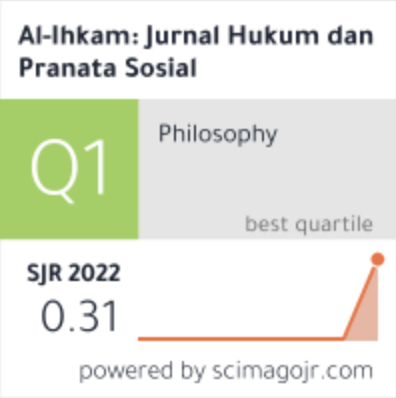UNIVERSALITAS DAN LOKALITAS HUKUM ISLAM
 Abstract views: 642
,
Abstract views: 642
,
 PDF downloads: 1314
PDF downloads: 1314
Abstract
Islamic law has two dimensions at once, namely universality and locality. In contemporary Islamic legal thought, there are two trends that contain mutual attraction between the two to bring dimension of locality to the dimension of universality on one side, and vice versa on the other side. As a consequence, there will be two possibilities, absoluteness or relativization of Islamic law. The legal discourse increasingly gains its own intensity in recently in line with the development of science and the use of various approaches in the study of Islamic law. Islamic law that is universally used is called syari`ah. This syariah law is rules of Allah SWT that is produced from texts with qath’î quality either from the side of the existency or the meanings without human beings rasional (ra’y) intervention because those texts are not the object of Ijtihad. Meanwhile, local Islamic Law is called fiqh. It is the law which is produced from texts with zhannî quality and becomes an object of Ijtihad. Because Fiqh is the result of Ijtihad so that it is usual when there are many madzhabs on it. Therefore, this paper will put this issue in proportion to find common ground between the two trends of contemporary Islamic legal thought. So that, it will hopefully clear up us the limits of universality and locality dimension of Islamic law, a focus of this legal discourse.
Downloads
References
Daftar Pustaka
Abdillah, Mujiono. Dialektika Hukum Islam & Perubahan Sosial. Surakarta: Universitas Muhammadiyah, 2003.
Abu Zahrah, Muhammad. Târîkh al-Madzâhib al-Islâmiyyah. Singapura-Jeddah: Al-Haramayn, t.th.
____________________, Ushûl al-Fiqh, Mesir: Dâr al-Ma’ârif, t.th.
Azizy, Qadry. Hukum Nasional, Eklektisisme Hukum Islam & Hukum Umum. Jakarta: Teraju, 2004.
Hashim, Mohammad Kamali. Shari’ah Law: An Inroduction, terj. Miki Salman. Jakarta: Noura Books, 2013.
Ibn Manzhûr. Lisân al-‘Arab. Beirut: Dâr al-Fikr, t.th.
Khallâf, Abd al-Wahhâb. ‘Ilm Ushûl al-fiqh. Kuwait: Dâr al-Qalam, 1978.
Madjid, Nurcholish. Islam, Doktrin dan Peradaban. Jakarta: Yayasan Wakaf Paramadina, 1995.
Nadawî, Ali Ahmad al-. Al-Qawâ’id al-Fiqhiyyah. Damaskus: Dâr al-Qalam, 1991.
Nawawî, Yahya ibn Syarf al-. Al-Minhâj fi Syarh Shahîh Muslim. t.tp: Bait al-Afkâr al-Dauliyah, t.th.
Saiys, Muhammad Ali al-. Târîkh al-Fiqh al-Islâmî. Mesir: Maktabah Muhammad Ali Shubaih Wa Aulâdih, t.th.
Shabunî, Muhammad Ali al-. Al-Nubuwwah wa al-Anbiyâ’. Damaskus: Maktabah al-Ghazâlî, 1985.
Sumai’î, Muhammad al-Rastaqi. Al-Qadîm wa al-Jadîd min Aqwâl al-Imâm al-Syâfi’î, t.tp: Dâr ibn Hazm, t.th.
Syafii, Muhammad Antonio dkk. Ensiklopedia Leadership & manajemen Muhammad SAW. Jakarta: Tazkia Publishing, 2010.
Syaltut, Mahmud. Al-Islâm, `Aqîdah wa Syarî’ah. t.tp: Dar al-Qalam, 1966.
Syâthibî, Abu Ishaq al-. al-Muwâfaqât. Beirut: Dâr al-Ma’rifah, 1975.
Turkî, Abdullah ibn Abd al-Muhsin al-. Ushûl al-Madzhab al-Imâm Ahmad, Riyâdh : Maktabah al-Riyâdh al-Hadîtsah, 1980.
Yusuf, Muhamad Musa. al-Madkhal li Dirâsât al-Fiqh al-Islâmî. t.tp: Dâr al-Fikr al-Arabî, t.th.
Zuhaylî, Wahbah al-. Ushûl al-Fiqh al-Islâmî. Damaskus: Dâr al-Fikr, 1986.
In order to be accepted and published by Al-Ihkam: Jurnal Hukum dan Pranata Sosial, author(s) submitting the article manuscript should complete all the review stages. By submitting the manuscript, the author(s) agreed to the following terms:
- The copyright of received articles shall be assigned to Al-Ihkam: Jurnal Hukum dan Pranata Sosial as the publisher of the journal. The intended copyright includes the right to publish articles in various forms (including reprints). Al-Ihkam: Jurnal Hukum dan Pranata Sosial maintain the publishing rights to the published articles.
- Authors are permitted to disseminate published articles by sharing the link/DOI of the article at Al-Ihkam: Jurnal Hukum dan Pranata Sosial. Authors are allowed to use their articles for any legal purposes deemed necessary without written permission from Al-Ihkam: Jurnal Hukum dan Pranata Sosial with an acknowledgment of initial publication to this journal.
- Users/public use of this website will be licensed to CC-BY-SA.



.png)
_1.png)










